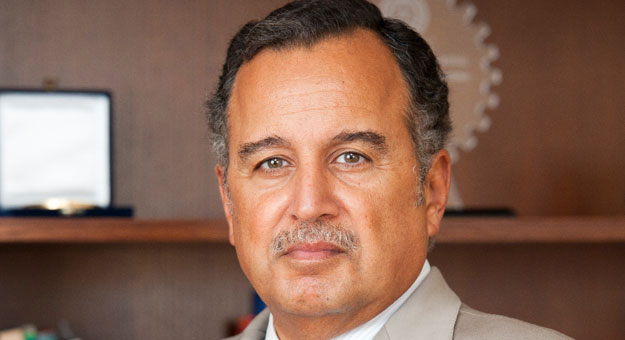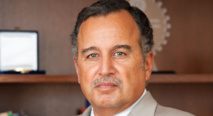The freeze had been imposed when Cairo's military-installed leaders failed to restore full democracy after toppling president Mohamed Morsi.
But the release of some 10 Apache helicopters and $650 million in other military aid to Egypt a month before closely watched presidential elections has been widely criticized by rights groups.
The organizations have said that they're troubled by a brutal crackdown by Egyptian authorities which has seen scores of opposition leaders and journalists jailed.
- 'Clear message to Cairo' -
It is "a strong signal that the United States wants to improve, or at least start to improve, relations with Cairo despite a deteriorating human rights environment," analyst Amy Hawthorne told a conference call.
The administration is "sending a clear message to Cairo that the US-Egypt security relationship, especially focused on counterterrorism and the counterterrorism campaign in the Sinai, remains critically important," added the senior fellow with the Atlantic Council.
Fahmy is due to meet with US Secretary of State John Kerry and Defense Secretary Chuck Hagel on Tuesday, and officials are also trying to schedule talks with national security advisor Susan Rice and US lawmakers.
But while Kerry certified this week that Egypt had met the terms of its strategic partnership with the US and Israel, he was highly critical of the lack of democratic progress.
More than 500 people, mostly policemen and soldiers, have been killed in militant attacks since Morsi's overthrow, according to Egyptian authorities, who have also been battling jihadists sheltering in the Sinai Peninsula.
Amnesty International says, however, that more than 1,400 people have died in the police crackdown targeting Morsi's supporters, while more than 15,000 have been jailed.
"We remain concerned about steps that Egypt has taken in recent months that have been against democratic principles, such as media freedom, freedom of speech, freedom of individuals to protest the political arrests," State Department spokeswoman Jen Psaki said Friday.
- Re-think in US policies -
The wave of insecurity is helping former army chief Abdel Fattah al-Sisi ride a wave of popularity to become the frontrunner in the May 26-27 vote -- leaving Washington facing the uncomfortable prospect that the man who deposed the country's first democratically elected president could be its next leader.
"If mass killings, mass arrests, and mass death sentences are not enough to make clear that freedoms are far from being 'restored' in Egypt, what is?" said Sarah Margon from Human Rights Watch.
Ties between the US and Egyptian militaries run deep and Kerry has long praised the Egyptian army as a stabilizing force in the country as well as the volatile region.
But the political upheaval and the brutal crackdown has forced a re-think in US policies, and Kerry has harshly criticized moves such as a court issuing hundreds of death sentences against Morsi supporters.
"I think the relationship has been strained, to say the least," a top Egyptian official said, asking not to be named, adding that there is "a need for a candid conversation about the relationship" which he said remained important to both sides.
"It's good that after more than 30 years we take a step back and look at the relationship, where it worked and where it didn't work."
He acknowledged that there had been what he called "over-reactions" by some courts and the judiciary, but put his faith in Egypt's new constitution to correct some of these excesses.
And he warned that in the wake of the Arab spring the region was facing a "critical juncture," pointing to Libya as the "number one threat for national security in Egypt" as it was awash with weapons, and plagued by political chaos and a lack of governance.
Brookings Institution analyst Khaled Elgindy criticized however what he called America's "disjointed policy" on Egypt.
"Egypt's not transitioning to democracy, it's transitioning to something worse than it was under Mubarak," he told AFP, referring to long-time ruler Hosni Mubarak who was deposed by mass protests in 2011.
"We talk a good talk about liberties and democracy, but we don't walk that walk. When push comes to shove, we side with what we perceive to be our vital interests," he said, adding Washington had merely made "a rhetorical nod to democracy" in Egypt.
--------------------------------------------------------------
But the release of some 10 Apache helicopters and $650 million in other military aid to Egypt a month before closely watched presidential elections has been widely criticized by rights groups.
The organizations have said that they're troubled by a brutal crackdown by Egyptian authorities which has seen scores of opposition leaders and journalists jailed.
- 'Clear message to Cairo' -
It is "a strong signal that the United States wants to improve, or at least start to improve, relations with Cairo despite a deteriorating human rights environment," analyst Amy Hawthorne told a conference call.
The administration is "sending a clear message to Cairo that the US-Egypt security relationship, especially focused on counterterrorism and the counterterrorism campaign in the Sinai, remains critically important," added the senior fellow with the Atlantic Council.
Fahmy is due to meet with US Secretary of State John Kerry and Defense Secretary Chuck Hagel on Tuesday, and officials are also trying to schedule talks with national security advisor Susan Rice and US lawmakers.
But while Kerry certified this week that Egypt had met the terms of its strategic partnership with the US and Israel, he was highly critical of the lack of democratic progress.
More than 500 people, mostly policemen and soldiers, have been killed in militant attacks since Morsi's overthrow, according to Egyptian authorities, who have also been battling jihadists sheltering in the Sinai Peninsula.
Amnesty International says, however, that more than 1,400 people have died in the police crackdown targeting Morsi's supporters, while more than 15,000 have been jailed.
"We remain concerned about steps that Egypt has taken in recent months that have been against democratic principles, such as media freedom, freedom of speech, freedom of individuals to protest the political arrests," State Department spokeswoman Jen Psaki said Friday.
- Re-think in US policies -
The wave of insecurity is helping former army chief Abdel Fattah al-Sisi ride a wave of popularity to become the frontrunner in the May 26-27 vote -- leaving Washington facing the uncomfortable prospect that the man who deposed the country's first democratically elected president could be its next leader.
"If mass killings, mass arrests, and mass death sentences are not enough to make clear that freedoms are far from being 'restored' in Egypt, what is?" said Sarah Margon from Human Rights Watch.
Ties between the US and Egyptian militaries run deep and Kerry has long praised the Egyptian army as a stabilizing force in the country as well as the volatile region.
But the political upheaval and the brutal crackdown has forced a re-think in US policies, and Kerry has harshly criticized moves such as a court issuing hundreds of death sentences against Morsi supporters.
"I think the relationship has been strained, to say the least," a top Egyptian official said, asking not to be named, adding that there is "a need for a candid conversation about the relationship" which he said remained important to both sides.
"It's good that after more than 30 years we take a step back and look at the relationship, where it worked and where it didn't work."
He acknowledged that there had been what he called "over-reactions" by some courts and the judiciary, but put his faith in Egypt's new constitution to correct some of these excesses.
And he warned that in the wake of the Arab spring the region was facing a "critical juncture," pointing to Libya as the "number one threat for national security in Egypt" as it was awash with weapons, and plagued by political chaos and a lack of governance.
Brookings Institution analyst Khaled Elgindy criticized however what he called America's "disjointed policy" on Egypt.
"Egypt's not transitioning to democracy, it's transitioning to something worse than it was under Mubarak," he told AFP, referring to long-time ruler Hosni Mubarak who was deposed by mass protests in 2011.
"We talk a good talk about liberties and democracy, but we don't walk that walk. When push comes to shove, we side with what we perceive to be our vital interests," he said, adding Washington had merely made "a rhetorical nod to democracy" in Egypt.
--------------------------------------------------------------









 Home
Home Politics
Politics











